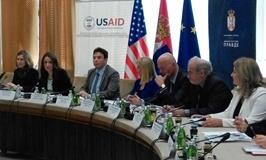
For Immediate Release
Belgrade – On September 21, 2016, the Ministry of Justice of the Republic of Serbia, with support from the USAID Judicial Reform and Government Accountability Project, organized the conference Law on the Protection of Whistleblowers – First Year of Implementation. The conference presented achievements since the Law came into effect, the efficiency of available channels for blowing the whistle, and providing judicial relief for whistleblowers.
Serbia’s new Law on the Protection of Whistleblowers came into effect in June 2015. The Law incorporates global best practices to shield whistleblowers from retaliation. It specifies channels for blowing the whistle, and insists on reverse burden of proof, so that whistleblowers can stand a chance against their employers and authorities when seeking justice.
During the first year of implementation, several dozens of court proceedings were initiated resulting in judicial relief for whistleblowers. This unprecedented sensitivity of the Serbian courts for whistleblowing cases, even in global proportions, results from a joint effort of the Ministry of Justice, Judicial Academy, USAID, and the Department of Justice to train nearly 1,200 judges throughout Serbia to prepare them to adjudicate in whistleblowing cases.
Тhe first annual statistics show that all ministries defined and introduced internal whistleblowing channels. This is closely related to intensive oversight implemented by the Labor and Administrative Inspectorates, fostering strong implementation in government agencies.
The web portal pistaljka.rs and their Helpline service, established with USAID assistance are resources for potential whistleblowers seeking advice about how to blow a whistle and be protected from retaliation. Their team of lawyers represented whistleblowers before the courts, winning the first decision of a first-instance court in a whistleblower case since the new Law came into effect. “Even during the drafting phase, we believed that only judges and court orders could effectively protect whistleblowers. Although there are still problems in implementation, many judges sided with the whistleblowers”, said Jelena Stojanovic, a Pistaljka lawyer.
“The path of a whistleblower is a hard one to take. They should be aware of the hardships and responsibility that comes with whistleblowing, and the importance of the fight they are taking on - the fight against corruption”, said Radomir Ilić, State Secretary at the Ministry of Justice. “It is only by forging alliances between the whistleblowers, civil society and the media that it will be possible to ensure those whistleblowers’ testimonies effect a change.”







Comment
Make a general inquiry or suggest an improvement.